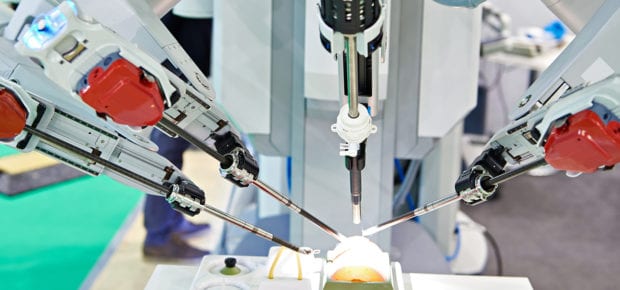July 16, 2018
When thinking about the future of medicine, it’s easy to overlook the fact that robots are already an active part of operating rooms around the world. Together with humans, robots are making procedures more precise and effective. And with advances in AI, they’re starting to do more on their own.
So far, the surgical robots that have seen commercial success help surgeons execute precise maneuvers that they otherwise might not be able to do alone. In an article on surgical robots, IEEE Spectrum concludes: “At the end of the day, the robot is just a fancier tool under direct human control.”
However, times are changing. In a separate piece from IEEE Spectrum, the author notes that a few surgical procedures already incorporate smart machines: “Robots routinely carry out the crucial steps in some procedures including orthopedic knee replacements, Lasik eye surgery and hair transplants.” Using visual inputs, they’re able to chart their own surgical course. They can even do it more precisely than expert surgeons, and with less tissue damage.
Research on Artificial Intelligence, Robots and the Operating Room
When asked about their willingness to allow robots powered by AI technology to operate on their young children (ages eight and younger), Millennial parents in a 2018 IEEE global survey were likely to allow it, particularly in Asia: 82 percent in China and 78 percent in India said they would be “very likely”. Meanwhile, 45 percent in both the U.S. and U.K. say they would be “very likely”.
Compared to a recent 2020 global survey, a majority of Millennial parents are 29 percent extremely or 31 percent very likely to allow robots powered by AI to conduct surgery on their child. Though parents in China are 63 percent very and 26 percent extremely likely to allow robotic surgery on their child, 41 percent of American parents say they are not likely at all to allow it.
Part of this trust comes from precision, and current surgical applications operate on fixed targets, which strong AI is capable of learning quickly. When it comes to operating on soft tissue, like within the abdomen, progress is slower. To put it bluntly, as the surgical robots article does, “All the parts that make up a person’s innards can shift around during procedures, so the robot will have to continuously modify its surgical plan.” Researchers are working to bridge that gap.
AI development is a growing role in the operating room and isn’t limited to robotics. Another way advanced computing can help doctors succeed is by optimizing the scheduling of procedures.
A few years ago, the Mayo Institute experimented with using AI systems to assist with their spinal surgery scheduling. Kevin Curran, IEEE Senior member and Professor of Cybersecurity at Ulster University, recounts the effort: “The algorithm mined a trove of historical data on previous surgeries to ascertain how much time was being spent on each operation, and used additional factors such as patient’s profile and doctor’s previous cases. In a pilot, utilization increased by 19% and overtime was reduced by 10%.”
The roles of AI and robotics in healthcare are increasing rapidly. To see how the competition between doctors and AI is going, you can visit IEEE Spectrum’s “AI vs Doctors” page.







 Meaningful Momentum or Running in Place?
Meaningful Momentum or Running in Place? AI Through Our Ages
AI Through Our Ages Liquid Infrastructure: Our Planet's Most Precious Resource
Liquid Infrastructure: Our Planet's Most Precious Resource The Impact of Technology in 2025
The Impact of Technology in 2025 Quantum and AI: Safeguards or Threats to Cybersecurity?
Quantum and AI: Safeguards or Threats to Cybersecurity? Why AI Can't Live Without Us
Why AI Can't Live Without Us Bits, Bytes, Buildings and Bridges: Digital-Driven Infrastructure
Bits, Bytes, Buildings and Bridges: Digital-Driven Infrastructure Impact of Technology in 2024
Impact of Technology in 2024 Emerging AI Cybersecurity Challenges and Solutions
Emerging AI Cybersecurity Challenges and Solutions The Skies are Unlimited
The Skies are Unlimited Smart Cities 2030: How Tech is Reshaping Urbanscapes
Smart Cities 2030: How Tech is Reshaping Urbanscapes Impact of Technology 2023
Impact of Technology 2023 Cybersecurity for Life-Changing Innovations
Cybersecurity for Life-Changing Innovations Smarter Wearables Healthier Life
Smarter Wearables Healthier Life Infrastructure In Motion
Infrastructure In Motion The Impact of Tech in 2022 and Beyond
The Impact of Tech in 2022 and Beyond Cybersecurity, Technology and Protecting Our World
Cybersecurity, Technology and Protecting Our World How Technology Helps us Understand Our Health and Wellness
How Technology Helps us Understand Our Health and Wellness The Resilience of Humanity
The Resilience of Humanity Harnessing and Sustaining our Natural Resources
Harnessing and Sustaining our Natural Resources Creating Healthy Spaces Through Technology
Creating Healthy Spaces Through Technology Exceptional Infrastructure Challenges, Technology and Humanity
Exceptional Infrastructure Challenges, Technology and Humanity The Global Impact of IEEE's 802 Standards
The Global Impact of IEEE's 802 Standards Scenes of our Cyber Lives: The Security Threats and Technology Solutions Protecting Us
Scenes of our Cyber Lives: The Security Threats and Technology Solutions Protecting Us How Millennial Parents are Embracing Health and Wellness Technologies for Their Generation Alpha Kids
How Millennial Parents are Embracing Health and Wellness Technologies for Their Generation Alpha Kids Space Exploration, Technology and Our Lives
Space Exploration, Technology and Our Lives Global Innovation and the Environment
Global Innovation and the Environment How Technology, Privacy and Security are Changing Each Other (And Us)
How Technology, Privacy and Security are Changing Each Other (And Us) Find us in booth 31506, LVCC South Hall 3 and experience the Technology Moon Walk
Find us in booth 31506, LVCC South Hall 3 and experience the Technology Moon Walk Virtual and Mixed Reality
Virtual and Mixed Reality How Robots are Improving our Health
How Robots are Improving our Health IEEE Experts and the Robots They are Teaching
IEEE Experts and the Robots They are Teaching See how millennial parents around the world see AI impacting the lives of their tech-infused offspring
See how millennial parents around the world see AI impacting the lives of their tech-infused offspring Take the journey from farm to table and learn how IoT will help us reach the rising demand for food production
Take the journey from farm to table and learn how IoT will help us reach the rising demand for food production Watch technical experts discuss the latest cyber threats
Watch technical experts discuss the latest cyber threats Explore how researchers, teachers, explorers, healthcare and medical professionals use immersive technologies
Explore how researchers, teachers, explorers, healthcare and medical professionals use immersive technologies Follow the timeline to see how Generation AI will be impacted by technology
Follow the timeline to see how Generation AI will be impacted by technology Learn how your IoT data can be used by experiencing a day in a connected life
Learn how your IoT data can be used by experiencing a day in a connected life Listen to technical experts discuss the biggest security threats today
Listen to technical experts discuss the biggest security threats today See how tech has influenced and evolved with the Games
See how tech has influenced and evolved with the Games Enter our virtual home to explore the IoT (Internet of Things) technologies
Enter our virtual home to explore the IoT (Internet of Things) technologies Explore an interactive map showcasing exciting innovations in robotics
Explore an interactive map showcasing exciting innovations in robotics Interactively explore A.I. in recent Hollywood movies
Interactively explore A.I. in recent Hollywood movies Get immersed in technologies that will improve patients' lives
Get immersed in technologies that will improve patients' lives